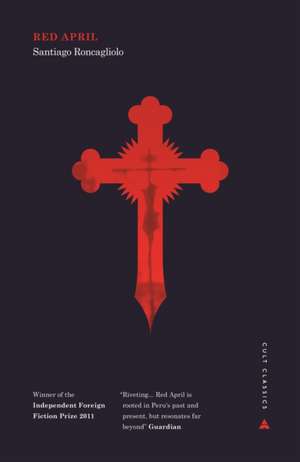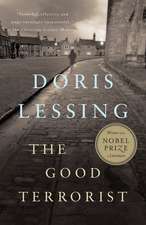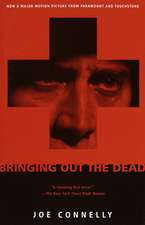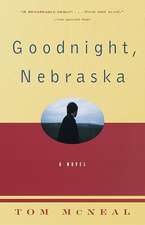Red April: Atlantic Cult Classics
Autor Santiago Roncagliolo Traducere de Edith Grossmanen Limba Engleză Paperback – 5 apr 2018
Preț: 125.39 lei
Nou
Puncte Express: 188
Preț estimativ în valută:
23.100€ • 26.06$ • 20.16£
23.100€ • 26.06$ • 20.16£
Cartea se retipărește
Doresc să fiu notificat când acest titlu va fi disponibil:
Se trimite...
Preluare comenzi: 021 569.72.76
Specificații
ISBN-13: 9781786495402
ISBN-10: 1786495406
Pagini: 288
Dimensiuni: 126 x 194 x 24 mm
Greutate: 0.29 kg
Ediția:Main - Print on demand
Editura: ATLANTIC BOOKS LTD
Seria Atlantic Cult Classics
ISBN-10: 1786495406
Pagini: 288
Dimensiuni: 126 x 194 x 24 mm
Greutate: 0.29 kg
Ediția:Main - Print on demand
Editura: ATLANTIC BOOKS LTD
Seria Atlantic Cult Classics
Notă biografică
Santiago Roncagliolo
Extras
Prosecutor Chacaltana wrote the final period with a grimace of doubt on his lips. He read the page again, erased a tilde, and added a comma in black ink. Now it was fine. A good report. He had followed all the prescribed procedures, chosen his verbs with precision, and had not fallen into the unrestrained use of adjectives customary in legal texts. He avoided words with ñ—because his Olivetti 75 had lost its ñ—but he knew enough words so he did not need it. He had a large vocabulary and could replace one term with another. He repeated to himself with satisfaction that in his lawyer’s heart, a poet struggled to emerge.
He removed the pages from the typewriter, kept the carbon paper for future documents, and placed each copy of the document in its respective envelope: one for the files, one for the criminal court, one for the case record, and one for the command of the military region. He still had to attach the forensic report. Before going to police headquarters, he wrote once again—as he did every morning—his supply requisition for a new typewriter, two pencils, and a ream of carbon paper. He had already submitted thirty-six requisitions and kept the signed receipts for all of them. He did not want to become aggressive, but if the supplies did not arrive soon, he could initiate an administrative procedure to demand them more forcefully.
After delivering his requisition personally and making sure the receipt was signed, he went out to the Plaza de Armas. The loudspeakers placed at the four corners of the square were broadcasting the life and works of eminent Ayacuchans as part of the campaign of the Ministry of the Presidency to breathe patriotic values into the province: Don Benigno Huaranga Céspedes, a distinguished Ayacuchan physician, had studied at the National University of San Marcos and dedicated his life to the science of medicine, a field in which he reaped diverse tributes and various honors. Don Pascual Espinoza Chamochumbi, an outstanding Huantan attorney, distinguished himself by his vocation for helping the province, to which he bequeathed a bust of the Liberator Bolívar. For Associate District Prosecutor Félix Chacaltana Saldívar, those lives solemnly declaimed on the Plaza de Armas were models to be followed, exemplars of the capacity of his people to move forward despite poverty. He wondered if someday, on the basis of his tireless labor in the cause of justice, his name would deserve to be repeated by those loudspeakers.
He approached the newspaper cart and asked for El Comercio. The vendor said that today’s edition hadn’t arrived in Ayacucho yet, but he did have yesterday’s. Chacaltana bought it. Nothing can change much from one day to the next, he thought, all days are basically the same. Then he continued on his way to police headquarters.
As he walked, the corpse in Quinua produced a vague mixture of pride and disquiet in him. It was his first murder in the year he had been back in Ayacucho. It was a sign of progress. Until now, any death had gone directly to Military Justice, for reasons of security. The Office of the Prosecutor received only drunken fights or domestic abuse, at the most some rape, frequently of a wife by her husband.
Prosecutor Chacaltana saw in this a problem in the classification of crimes and, as a matter of fact, had forwarded to the criminal court in Huamanga a brief in that regard, to which he had not yet received a response. According to him, such practices within a legal marriage could not be called rapes. Husbands do not rape their wives: they fulfill conjugal duties. But Prosecutor Félix Chacaltana Saldívar, who understood human weakness, normally drew up a document of reconciliation to bring together the parties, and had the husband pledge to fulfill his virile duty without causing lesions of any kind. The prosecutor thought of his ex-wife Cecilia. She had never complained, at least not about that. The prosecutor had treated her with respect; he had barely touched her. She would have been astonished to see the importance of the case of the corpse. She would have admired him, for once.
In the reception area at police headquarters, a solitary sergeant was reading a sports paper. Associate District Prosecutor Félix Chacaltana Saldívar walked forward with resounding steps and cleared his throat.
“I am looking for Captain Pacheco.”
The sergeant raised bored eyes. He was chewing on a matchstick.
“Captain Pacheco?”
“Affirmative. We have a proceeding of the greatest importance.”
The prosecutor identified himself. The sergeant seemed uncomfortable. He looked to one side. The prosecutor thought he saw someone, the shadow of someone. Perhaps he was mistaken. The sergeant wrote down the prosecutor’s name and left reception, carrying the paper. The prosecutor heard his voice and another in the room to the side, without being able to make out what they were saying. In any event, he tried not to hear. That would have constituted a violation of institutional communications. The sergeant returned eight minutes later.
“Well, the fact is . . . today’s Thursday, Señor Prosecutor. On Thursdays the captain only comes in the afternoon . . . if he comes . . . because he has various proceedings to take care of too . . .”
“But procedure demands that we go together to pick up the report on the recent homicide . . . and we agreed that . . .”
“. . . and tomorrow’s complicated too, Señor Prosecutor, because they’ve called for a parade on Sunday and we have to prepare all the preparations.”
The prosecutor tried to offer a conclusive argument:
“. . . The fact is . . . the deceased cannot wait . . .”
“He’s not waiting for anything anymore, Señor Prosecutor. But don’t worry, I’m going to communicate to the captain that you appeared in person at our office with regard to the corresponding homicide.”
Without knowing exactly how, the Associate District Prosecutor was allowing himself to be led to the door by the subordinate’s words. He tried to respond, but it was too late to speak. He was on the street. He took a handkerchief from his pocket and wiped away perspiration. He did not know exactly what to do, if he should forget procedure or wait for the captain. But Monday was too long to wait. They were going to demand a punctual report from him. He would go alone. And submit a complaint to the General Administration of Police, with a copy to the Office of the Provincial Prosecutor.
He thought again of the corpse, and that reminded him of his mother. He had not gone to see her. He would have to stop by his house on the way back from the hospital, to see if she was all right. He crossed the city in fifteen minutes, went into the Military Hospital, and looked for the burn unit or the morgue. He felt disoriented among the crippled, the beaten, the suffering. He decided to ask a nurse who, with an attitude of competent authority, had just dispatched two old men.
“Dr. Faustino Posadas, please?”
The nurse looked at him with contempt. Associate District Prosecutor Félix Chacaltana Saldívar wondered if it would be necessary to show his official documents. The nurse entered an office and came out five minutes later.
“The doctor has gone out. Have a seat and wait for him.”
“I . . . I just came for a paper. I need a forensic report.”
“Generally I don’t know anything about that. But have a seat, please.”
“I am the Associate Dist . . .”
It was useless. The nurse had gone out to restrain a woman who was screaming in pain. She was not hurt. She was simply screaming in pain. The prosecutor sat down between an ancient woman weeping in Quechua and a policeman with a bleeding cut on his hand. He opened his paper. The headline announced the government’s fraudulent scheme for the elections in April. He began to read with annoyance, thinking that these kinds of suspicions ought to be brought to the Ministry of Justice for the appropriate decision before being published in the press and causing unfortunate misunderstandings.
As he scanned the page, it seemed that the recruit at the entrance was observing him. No. Not now. He had looked away. Perhaps he had not even looked at him. He continued reading. Every six minutes, more or less, a nurse would emerge from a door and call one of the people in the waiting room, an armless man or a child with polio who would leave his place with groans of pain and sighs of relief. On the third page, the prosecutor felt that the police officer beside him was trying to read over his shoulder. When he turned, the policeman was absorbed in looking at his wound. Chacaltana closed the paper and put it in his lap, drumming with his fingers on the paper to while away the time.
Dr. Posadas did not come. The prosecutor wanted to say something to the nurse but did not know what to say. He looked up. Across from him a young woman was sobbing. Her face was bruised and red, and one eye was swollen shut. She rested her battered face on her mother’s shoulder. She looked unmarried.
Chacaltana wondered what to do about unmarried rape victims in the legal system. At first he had asked that rapists be imprisoned, according to the law. But the injured parties protested: if the attacker went to jail, the victim would not be able to marry him and restore her lost honor. This imposed the need, then, to reform the penal code. Satisfied with his reasoning, the prosecutor decided to send the criminal tribunal in Huamanga another brief in this regard, attaching a communication pressing for a response at the earliest opportunity. A harsh voice with a northern accent pulled him out of his reflections:
“Prosecutor Chacaltana?”
A short man wearing glasses, badly shaven and with greasy hair, stood beside him eating chocolate. His medical jacket was stained with mustard, creole sauce, and something brown, but he kept his shoulders clean and white to conceal the dandruff that fell from his head like snow.
“I’m Faustino Posadas, the forensic pathologist.”
He held out a chocolate-smeared hand, which the prosecutor shook. Then he led him down a dark corridor filled with suffering. Some people approached, moaning, pleading for help, but the doctor pointed them to the first waiting room with the nurse, please, I only see dead people.
“I haven’t seen you before,” said the doctor as they walked into a different pavilion, with another waiting room. “Are you from Lima?”
“I come from Ayacucho but lived in Lima since I was a boy. I was transferred here a year ago.”
The pathologist laughed.
“From Lima to Ayacucho? You must have behaved very badly, Señor Chacaltana . . .” Then he cleared his throat. “If . . . you’ll permit me to say so.”
The Associate District Prosecutor had never misbehaved. He had done nothing bad, he had done nothing good, he had never done anything not stipulated in the statutes of his institution.
“I requested the transfer. My mother is here, and I had not been back in twenty years. But now that there is no terrorism, everything is quiet, isn’t it?”
From the Hardcover edition.
He removed the pages from the typewriter, kept the carbon paper for future documents, and placed each copy of the document in its respective envelope: one for the files, one for the criminal court, one for the case record, and one for the command of the military region. He still had to attach the forensic report. Before going to police headquarters, he wrote once again—as he did every morning—his supply requisition for a new typewriter, two pencils, and a ream of carbon paper. He had already submitted thirty-six requisitions and kept the signed receipts for all of them. He did not want to become aggressive, but if the supplies did not arrive soon, he could initiate an administrative procedure to demand them more forcefully.
After delivering his requisition personally and making sure the receipt was signed, he went out to the Plaza de Armas. The loudspeakers placed at the four corners of the square were broadcasting the life and works of eminent Ayacuchans as part of the campaign of the Ministry of the Presidency to breathe patriotic values into the province: Don Benigno Huaranga Céspedes, a distinguished Ayacuchan physician, had studied at the National University of San Marcos and dedicated his life to the science of medicine, a field in which he reaped diverse tributes and various honors. Don Pascual Espinoza Chamochumbi, an outstanding Huantan attorney, distinguished himself by his vocation for helping the province, to which he bequeathed a bust of the Liberator Bolívar. For Associate District Prosecutor Félix Chacaltana Saldívar, those lives solemnly declaimed on the Plaza de Armas were models to be followed, exemplars of the capacity of his people to move forward despite poverty. He wondered if someday, on the basis of his tireless labor in the cause of justice, his name would deserve to be repeated by those loudspeakers.
He approached the newspaper cart and asked for El Comercio. The vendor said that today’s edition hadn’t arrived in Ayacucho yet, but he did have yesterday’s. Chacaltana bought it. Nothing can change much from one day to the next, he thought, all days are basically the same. Then he continued on his way to police headquarters.
As he walked, the corpse in Quinua produced a vague mixture of pride and disquiet in him. It was his first murder in the year he had been back in Ayacucho. It was a sign of progress. Until now, any death had gone directly to Military Justice, for reasons of security. The Office of the Prosecutor received only drunken fights or domestic abuse, at the most some rape, frequently of a wife by her husband.
Prosecutor Chacaltana saw in this a problem in the classification of crimes and, as a matter of fact, had forwarded to the criminal court in Huamanga a brief in that regard, to which he had not yet received a response. According to him, such practices within a legal marriage could not be called rapes. Husbands do not rape their wives: they fulfill conjugal duties. But Prosecutor Félix Chacaltana Saldívar, who understood human weakness, normally drew up a document of reconciliation to bring together the parties, and had the husband pledge to fulfill his virile duty without causing lesions of any kind. The prosecutor thought of his ex-wife Cecilia. She had never complained, at least not about that. The prosecutor had treated her with respect; he had barely touched her. She would have been astonished to see the importance of the case of the corpse. She would have admired him, for once.
In the reception area at police headquarters, a solitary sergeant was reading a sports paper. Associate District Prosecutor Félix Chacaltana Saldívar walked forward with resounding steps and cleared his throat.
“I am looking for Captain Pacheco.”
The sergeant raised bored eyes. He was chewing on a matchstick.
“Captain Pacheco?”
“Affirmative. We have a proceeding of the greatest importance.”
The prosecutor identified himself. The sergeant seemed uncomfortable. He looked to one side. The prosecutor thought he saw someone, the shadow of someone. Perhaps he was mistaken. The sergeant wrote down the prosecutor’s name and left reception, carrying the paper. The prosecutor heard his voice and another in the room to the side, without being able to make out what they were saying. In any event, he tried not to hear. That would have constituted a violation of institutional communications. The sergeant returned eight minutes later.
“Well, the fact is . . . today’s Thursday, Señor Prosecutor. On Thursdays the captain only comes in the afternoon . . . if he comes . . . because he has various proceedings to take care of too . . .”
“But procedure demands that we go together to pick up the report on the recent homicide . . . and we agreed that . . .”
“. . . and tomorrow’s complicated too, Señor Prosecutor, because they’ve called for a parade on Sunday and we have to prepare all the preparations.”
The prosecutor tried to offer a conclusive argument:
“. . . The fact is . . . the deceased cannot wait . . .”
“He’s not waiting for anything anymore, Señor Prosecutor. But don’t worry, I’m going to communicate to the captain that you appeared in person at our office with regard to the corresponding homicide.”
Without knowing exactly how, the Associate District Prosecutor was allowing himself to be led to the door by the subordinate’s words. He tried to respond, but it was too late to speak. He was on the street. He took a handkerchief from his pocket and wiped away perspiration. He did not know exactly what to do, if he should forget procedure or wait for the captain. But Monday was too long to wait. They were going to demand a punctual report from him. He would go alone. And submit a complaint to the General Administration of Police, with a copy to the Office of the Provincial Prosecutor.
He thought again of the corpse, and that reminded him of his mother. He had not gone to see her. He would have to stop by his house on the way back from the hospital, to see if she was all right. He crossed the city in fifteen minutes, went into the Military Hospital, and looked for the burn unit or the morgue. He felt disoriented among the crippled, the beaten, the suffering. He decided to ask a nurse who, with an attitude of competent authority, had just dispatched two old men.
“Dr. Faustino Posadas, please?”
The nurse looked at him with contempt. Associate District Prosecutor Félix Chacaltana Saldívar wondered if it would be necessary to show his official documents. The nurse entered an office and came out five minutes later.
“The doctor has gone out. Have a seat and wait for him.”
“I . . . I just came for a paper. I need a forensic report.”
“Generally I don’t know anything about that. But have a seat, please.”
“I am the Associate Dist . . .”
It was useless. The nurse had gone out to restrain a woman who was screaming in pain. She was not hurt. She was simply screaming in pain. The prosecutor sat down between an ancient woman weeping in Quechua and a policeman with a bleeding cut on his hand. He opened his paper. The headline announced the government’s fraudulent scheme for the elections in April. He began to read with annoyance, thinking that these kinds of suspicions ought to be brought to the Ministry of Justice for the appropriate decision before being published in the press and causing unfortunate misunderstandings.
As he scanned the page, it seemed that the recruit at the entrance was observing him. No. Not now. He had looked away. Perhaps he had not even looked at him. He continued reading. Every six minutes, more or less, a nurse would emerge from a door and call one of the people in the waiting room, an armless man or a child with polio who would leave his place with groans of pain and sighs of relief. On the third page, the prosecutor felt that the police officer beside him was trying to read over his shoulder. When he turned, the policeman was absorbed in looking at his wound. Chacaltana closed the paper and put it in his lap, drumming with his fingers on the paper to while away the time.
Dr. Posadas did not come. The prosecutor wanted to say something to the nurse but did not know what to say. He looked up. Across from him a young woman was sobbing. Her face was bruised and red, and one eye was swollen shut. She rested her battered face on her mother’s shoulder. She looked unmarried.
Chacaltana wondered what to do about unmarried rape victims in the legal system. At first he had asked that rapists be imprisoned, according to the law. But the injured parties protested: if the attacker went to jail, the victim would not be able to marry him and restore her lost honor. This imposed the need, then, to reform the penal code. Satisfied with his reasoning, the prosecutor decided to send the criminal tribunal in Huamanga another brief in this regard, attaching a communication pressing for a response at the earliest opportunity. A harsh voice with a northern accent pulled him out of his reflections:
“Prosecutor Chacaltana?”
A short man wearing glasses, badly shaven and with greasy hair, stood beside him eating chocolate. His medical jacket was stained with mustard, creole sauce, and something brown, but he kept his shoulders clean and white to conceal the dandruff that fell from his head like snow.
“I’m Faustino Posadas, the forensic pathologist.”
He held out a chocolate-smeared hand, which the prosecutor shook. Then he led him down a dark corridor filled with suffering. Some people approached, moaning, pleading for help, but the doctor pointed them to the first waiting room with the nurse, please, I only see dead people.
“I haven’t seen you before,” said the doctor as they walked into a different pavilion, with another waiting room. “Are you from Lima?”
“I come from Ayacucho but lived in Lima since I was a boy. I was transferred here a year ago.”
The pathologist laughed.
“From Lima to Ayacucho? You must have behaved very badly, Señor Chacaltana . . .” Then he cleared his throat. “If . . . you’ll permit me to say so.”
The Associate District Prosecutor had never misbehaved. He had done nothing bad, he had done nothing good, he had never done anything not stipulated in the statutes of his institution.
“I requested the transfer. My mother is here, and I had not been back in twenty years. But now that there is no terrorism, everything is quiet, isn’t it?”
From the Hardcover edition.












